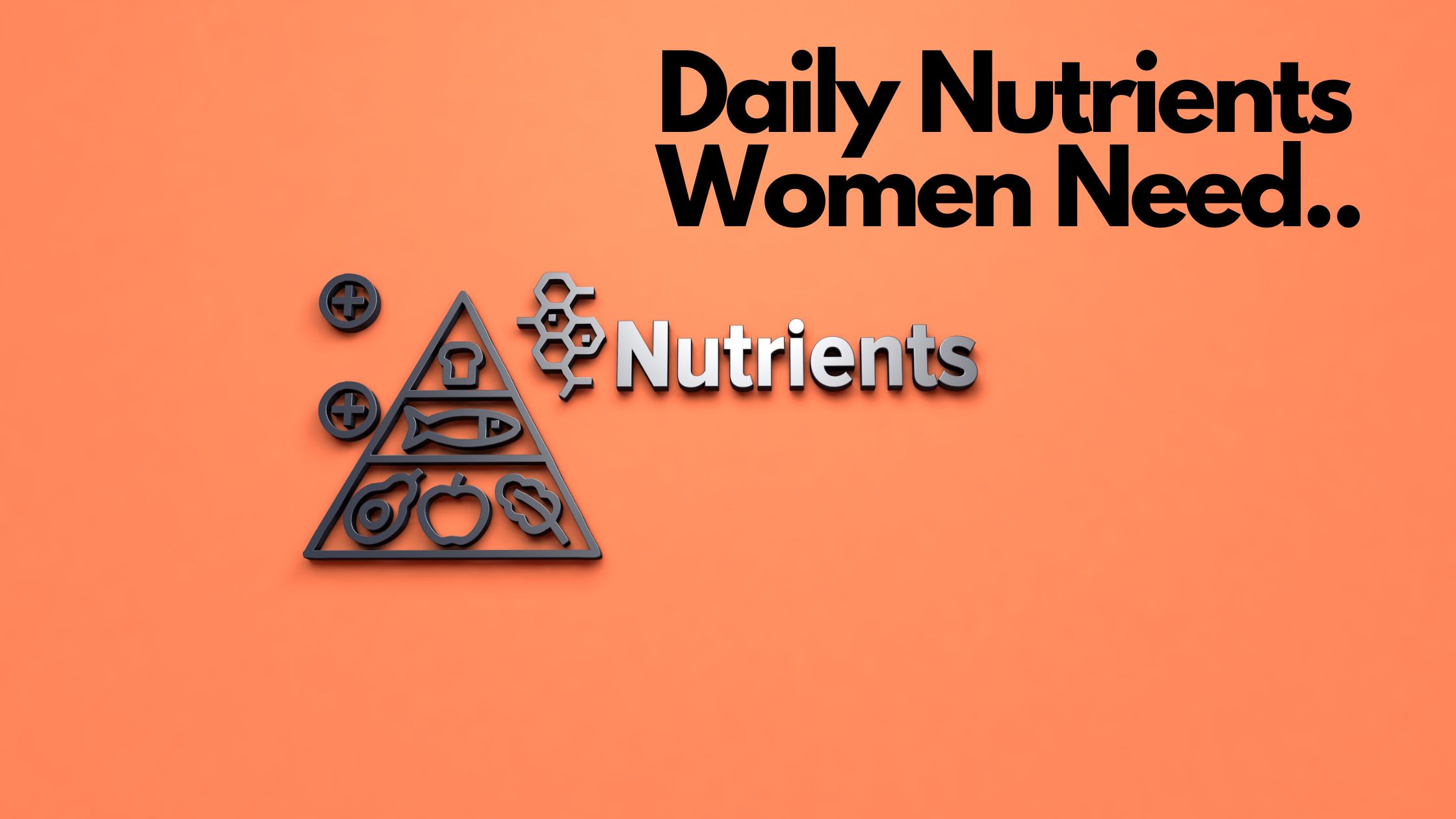Food is more than just calories. Food contains nutrients and these nutrients play a critical role in communicating with our body’s cells and systems, acting as biochemical messengers that influence various physiological processes. Let’s dive into what nutrients women need on a daily basis?
The human body requires a variety of nutrients to function properly. These nutrients can be categorized into macronutrients (carbohydrates, proteins, and fats) and micronutrients (vitamins and minerals).
Some nutrients need to be replenished daily, while others can be stored in the body and last longer. Here’s a detailed look at the macronutrients your body needs:
Recommended Carbohydrate Intake
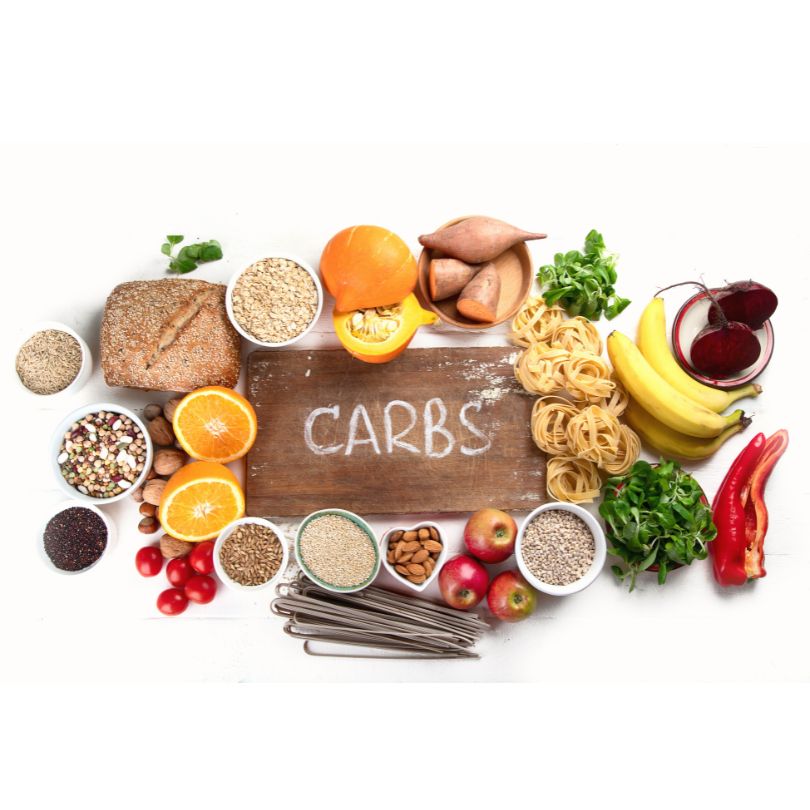
Daily Replacement
Carbohydrates often receive a mixed reputation in the diet world, especially for women navigating various life stages and health goals.
The Role of Carbohydrates
Carbohydrates are the body’s primary source of energy.
When consumed, they are broken down into glucose and fuel bodily functions and physical activity. They also signals the pancreas to release insulin.
Insulin helps regulate blood sugar levels and signals cells to uptake glucose for energy or storage as glycogen.
Carbohydrates are also crucial for brain function, as the brain relies heavily on glucose for energy.
Additionally, carbohydrates play a vital role in maintaining gut health, as they provide fibre (see below), which aids in digestion and promotes a healthy microbiome.
Carbohydrates should be consumed daily because they are quickly used for energy or stored as glycogen in the liver and muscles, which can be depleted within a day or two.
Are Carbohydrates Essential
Unlike proteins and fats, which are classified as essential nutrients (meaning the body cannot produce them and must obtain them through diet), carbohydrates are not technically essential.
The body can produce glucose from proteins and fats if necessary. However, for optimal health and energy levels, consuming carbohydrates is highly beneficial.
Are Carbs Bad for Women
So whilst carbs are both recommended and beneficial here are the downside of carbohydrates:
– **Weight Gain:** As metabolism slows with age, excess carbohydrate intake can more easily lead to weight gain.
– **Blood Sugar Spikes:** High carbohydrate intake, especially from refined carbs, can lead to spikes in blood sugar and insulin, contributing to weight gain and increasing the risk of type 2 diabetes.
– **Increased Hunger:** Rapid digestion of refined carbs can cause blood sugar crashes, leading to increased hunger and potential overeating.
Carbohydrates Recommended Daily Intake
The UK government’s Eatwell Guide recommends that carbohydrates make up around one-third of your diet.
For women, this means around 250 grams of carbohydrates per day on a 1600-2,000-calorie diet. Of course, individual needs may vary based on factors such as age, activity level, and health goals.
What are Net Carbs
Net carbohydrates are the total carbohydrates in a food minus the fibre and sugar alcohols (if any).
Fibre and certain sugar alcohols are not fully digested and absorbed by the body, so they do not significantly impact blood sugar levels.
Calculating net carbs can be especially useful for those on low-carb diets who aim to control blood sugar and insulin levels.
Consuming Excess Carbohydrates and Weight Gain
When you consume more carbohydrates than your body needs for energy, the excess is converted into fat and stored in adipose tissue, leading to weight gain.
High intake of refined carbohydrates and sugars can cause spikes in blood sugar levels, followed by crashes that increase hunger and cravings, potentially leading to overeating and further weight gain.
Low Carb Diets
Low-Carbohydrate Diets:
– Typically involve consuming 20-100 grams of net carbs per day.
– Focus on high-protein and high-fat foods while reducing carbohydrate intake.
– Pros: Can lead to rapid weight loss, improved blood sugar control, and reduced appetite.
– Cons: May lead to nutrient deficiencies if not well-balanced, can be difficult to maintain long-term, and may cause initial side effects like fatigue and dizziness.
Keto Diets
Keto Diets:
– Extremely low in carbohydrates (usually 20-50 grams of net carbs per day), high in fats, and moderate in proteins.
– The goal is to enter a state of ketosis, where the body burns fat for fuel instead of carbohydrates.
– Pros: Effective for rapid weight loss, improved mental clarity, and better blood sugar control.
– Cons: Can be challenging to maintain, may lead to nutrient deficiencies, potential for increased cholesterol levels, and may not be suitable for everyone, especially those with certain health conditions.
Top Carbohydrate Food Sources:
1. **Whole wheat bread (1 slice):** ~12g
2. **Brown rice (1 cup, cooked):** ~45g
3. **Oats (1 cup, cooked):** ~27g
4. **Quinoa (1 cup, cooked):** ~39g
5. **Banana (1 medium):** ~27g
Recommended Protein Intake
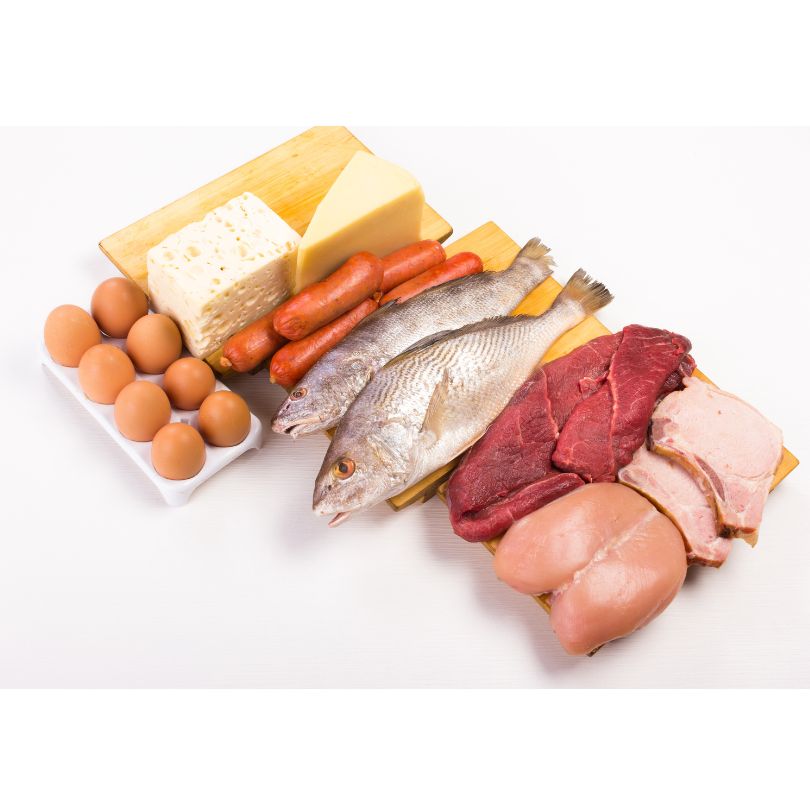
Protein Daily Replacement
Proteins are essential for tissue repair, muscle growth, and various metabolic processes.
Proteins are broken down into amino acids.
Proteins trigger the release of various hormones such as insulin and glucagon.
These hormones help regulate metabolism, muscle repair, and immune function.
Amino acids also act as precursors for neurotransmitters, which are crucial for brain function and mood regulation
While the body can recycle some amino acids, dietary protein should be consumed daily to ensure adequate supply for these functions.
Protein Recommended Daily Intake
The recommended daily intake of protein is 0.8g of protein per kilogram of bodyweight. For example a women weighing 70kg would need a minimum of 56 grams of protein each day.
However, for women looking to lose weight and/or build muscle and engaging in strength training, the recommended amount increases to about 1.2 to 2.0 grams of protein per kilogram of body weight.
The exact amount will depend on factors such as the intensity of training and individual goals.
Whilst this amount may seem daunting for some it is totally do-able, I combine quality protein shakes with high protein foods.
Pretty Pea protein powder is importantly low carbohydrate, packed full of daily essential vitamins and minerals, high in chicory root fibre and are under 100 calories per shake.
Protein intake should be split between each meal.
Protein increases satiety, so increasing your protein intake will have the added side effect of keeping you fuller for longer and curbing any snacking habits.
Top Protein Food Sources:
1. **Chicken breast (100g):** ~31g
2. **Salmon (100g):** ~25g
3. **Eggs (1 large):** ~6g
4. **Greek yogurt (1 cup):** ~10g
5. **Lentils (1 cup, cooked):** ~18g
Recommended Fat Intake
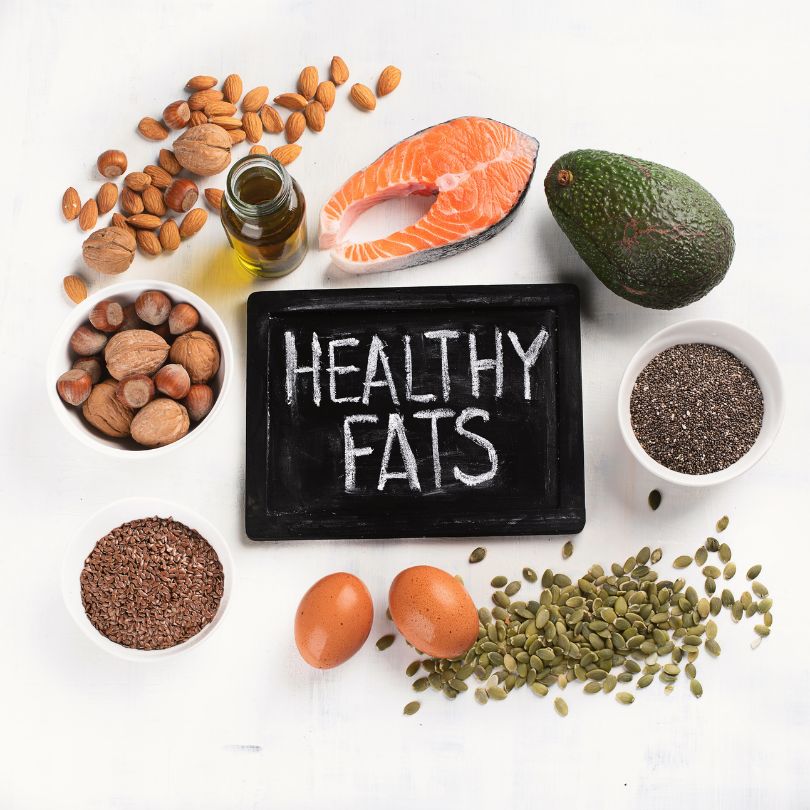
Longer Duration
Fats provide a concentrated energy source and are crucial for the absorption of fat-soluble vitamins (A, D, E, K).
Fats are metabolized into fatty acids and glycerol.
Fatty acids, particularly omega-3 and omega-6, are essential for the production of eicosanoids, which are signalling molecules that play roles in inflammation, immunity, and other critical cellular functions.
The body stores fats in adipose tissue, so they don’t need to be replenished as frequently as carbohydrates and proteins, but regular intake is still necessary.
Fats Recommended Daily Intake
Approximately 70 grams
Top Fats Food Sources:
1. **Avocado (1 medium):** ~21g
2. **Olive oil (1 tablespoon):** ~14g
3. **Almonds (1 ounce):** ~14g
4. **Chia seeds (1 ounce):** ~9g
5. **Salmon (100g):** ~13g
Recommended Fibre Intake
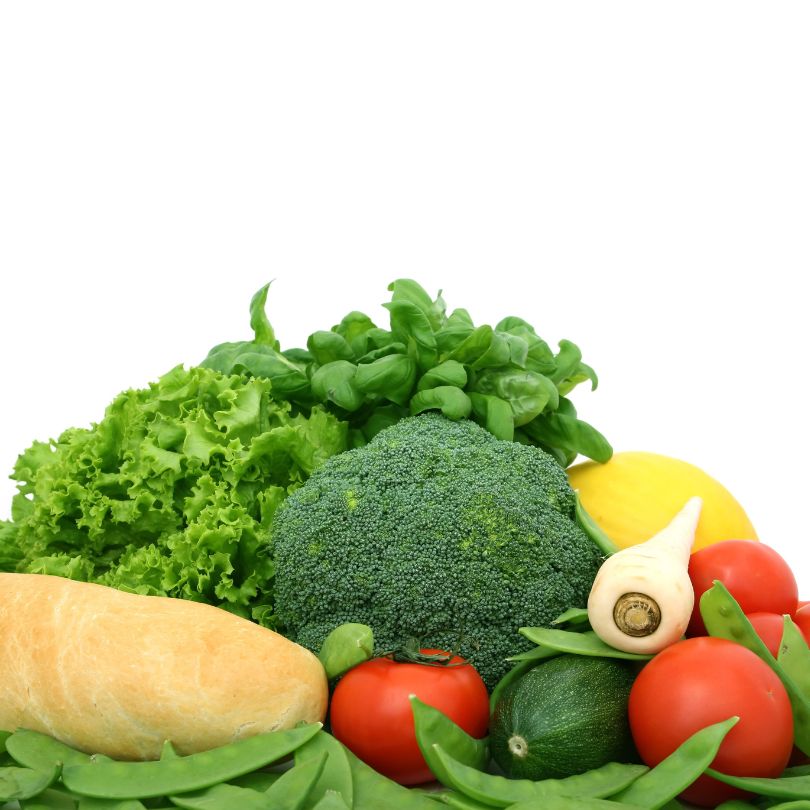
So when talking about what nutrients women need, we need to talk about fibre.
Fibre is essentially a carbohydrate so should be considered when calculating your daily carbohydrate needs.
Though not absorbed by the body, fibre affects gut health by influencing the microbiota.
Short-chain fatty acids (SCFAs) produced by the fermentation of fibre in the colon serve as signalling molecules that influence gut health, inflammation, and even brain function through the gut-brain axis.
Women are recommended to consume 30 grams per day, combining both soluble and insoluble fibres.
Fibre Benefits
- Digestive Health: Supports regular bowel movements and prevents constipation.
- Heart Health: Helps lower cholesterol levels and reduce heart disease risk.
- Blood Sugar Control: Slows sugar absorption, aiding in blood sugar management.
- Weight Management: Promotes a feeling of fullness, reducing overall calorie intake.
Top High Soluble Fibre Foods
- Oats: ~4 grams per cup (cooked)
- Beans and Lentils: ~6-8 grams per 100g (cooked)
- Chia Seeds: ~10 grams per ounce (28g)
- Apples: ~4 grams per medium apple
- Chicory Root (Inulin): ~3 grams per tablespoon – Chicory root contains inulin, a prebiotic soluble fibre (food for your gut microbiome)
Additional Recommendation: Glucomannan (from konjac root): ~ all fibre, so 1 gram of glucomannan = 1 gram of fibre.
Glucomannan is a highly viscous fibre, expanding up to 50 times its size once in your stomach.
Glucomannan’s many benefits include supporting blood glucose regulation, your digestive system and helping you feel fuller for longer and is a key nutrient in some of the Pretty Pea weight management supplements.
Glucomannan and weight loss: 3 grams per day supports weight loss, to be taken 1 gram, 3 times daily, before meals (and in the context of a calorie controlled diet)
Top High Insoluble Fibre Foods
- Whole Wheat Bread: ~2 grams per slice
- Brown Rice: ~3.5 grams per cup (cooked)
- Nuts: ~3 grams per 28g (1 ounce)
- Carrots: ~2.8 grams per cup (chopped, raw)
- Bran (wheat or corn): ~6 grams per 1/4 cup
Additional Recommended High-Fibre Food:
Sugar Beet Fibre: ~5 grams per tablespoon. Sugar Beet supports an increase in faecal bulk (bowel regularity).
Sugar beet fibre contains a mix of soluble and insoluble fibres, with a significant portion being soluble. These fibres are beneficial for gut health and can help regulate blood sugar and cholesterol levels.
What Nutrients Women Need – Summary
In summary, nutrients in food serve as essential messengers by regulating hormonal activity, cellular communication, and gene expression, thereby maintaining homeostasis and influencing overall health.
While carbohydrates are not classified as essential nutrients like proteins and fats, they play a critical role in providing energy and supporting overall health.
Women may benefit from understanding their carbohydrate, protein and fat needs and how different dietary approaches can impact their health and weight loss goals.
Whether choosing a balanced diet or exploring low-carb or Keto options, it is important to consider individual needs and consult healthcare professionals for personalized advice.
It’s best to obtain these nutrients through a balanced diet and only supplement where needed for example to top up your protein needs, or to fill gaps in the diet, or as advised by a healthcare professional.
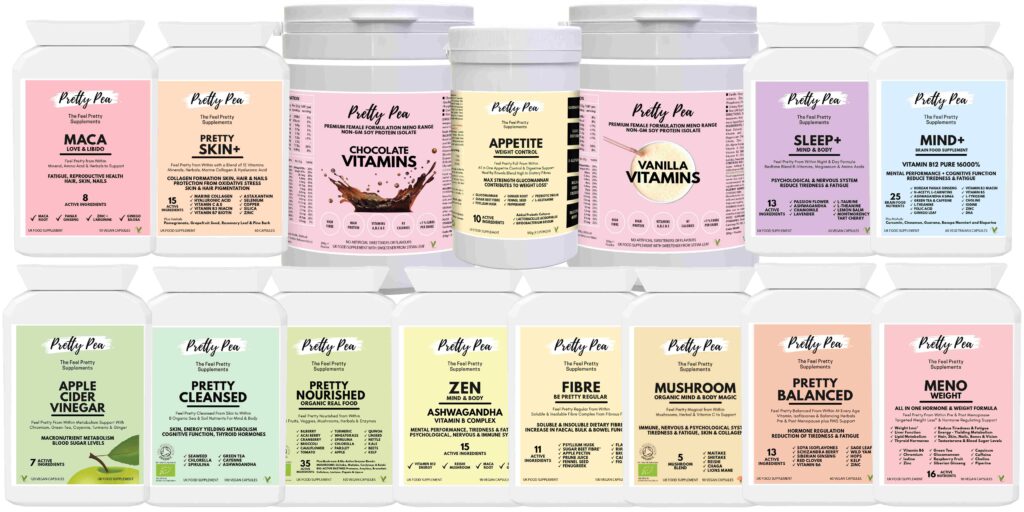
Sources of Information
Data from the UK National Health Service (NHS) and Food Standards Agency.
**UK Government Dietary Recommendations**
– Public Health England. (2016). Government dietary recommendations. [Link](https://assets.publishing.service.gov.uk/government/uploads/system/uploads/attachment_data/file/618167/government_dietary_recommendations.pdf)
**National Health Service (NHS) Guidelines**
– NHS. (2020). Vitamins and minerals – Nutrition and diet. [Link](https://www.nhs.uk/live-well/eat-well/)
**USDA National Nutrient Database for Standard Reference**
– United States Department of Agriculture. (2019). USDA National Nutrient Database for Standard Reference. [Link](https://fdc.nal.usda.gov/)
**Glucomannan related health claims | EFSA (europa.eu)**
Scientific Opinion on the substantiation of health claims related to konjac mannan (glucomannan) and reduction of body weight (ID 854, 1556, 3725), reduction of post-prandial glycaemic responses (ID 1559), maintenance of normal blood glucose concentrations (ID 835, 3724), maintenance of normal (fasting) blood concentrations of triglycerides (ID 3217), maintenance of normal blood cholesterol concentrations (ID 3100, 3217), maintenance of normal bowel function (ID 834, 1557, 3901) and decreasing potentially pathogenic gastro-intestinal microorganisms (ID 1558) pursuant to Article 13(1) of Regulation (EC) No 1924/2006
**Scientific Opinion on the substantiation of a health claim related to sugar beet fibre and increasing faecal bulk**
Sugar beet fibre and increasing faecal bulk | EFSA (europa.eu). http://efsa.europa.eu/en/efsajournal/pub/2468sing faecal bulk pursuant to Article 13(5) of Regulation (EC) No 1924/2006
National Health Service (NHS). The Eatwell Guide. Available at: https://www.nhs.uk/live-well/eat-well/the-eatwell-guide/
Public Health England. (2016). Government Dietary Recommendations.
Mayo Clinic Staff. (2020). Low-carb diet: Can it help you lose weight? Mayo Clinic.
Harvard T.H. Chan School of Public Health. Carbohydrates and Blood Sugar. The Nutrition Source.
